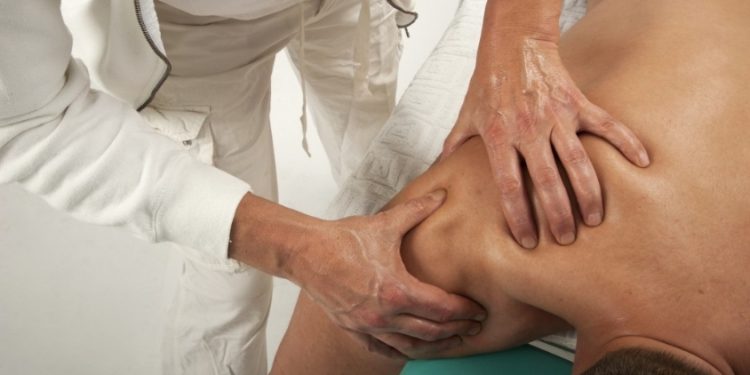If you are suffering from persistent shoulder pain that is impacting your ability to perform daily activities, your doctor may recommend physical therapy treatment.
Physical Therapy Advantage in Aurora can provide an effective rehabilitation program to help you reduce shoulder pain and restore normal function. Here is what to expect with physical therapy for shoulder pain.
Initial Evaluation
The initial evaluation appointment will last 45-60 minutes. The physical therapist will start by taking a full medical history and asking about any previous orthopedic injuries, surgeries, or chronic conditions like diabetes or arthritis that could affect shoulder function.
Expect questions about the exact location of shoulder pain, when it began, what specific movements aggravate it (reaching overhead, lifting objects, etc.), whether it wakes you at night, and whether over-the-counter medications provide relief.
You’ll describe day-to-day limitations like difficulty brushing hair or putting on shirts caused by shoulder pain. The therapist will inquire about your occupation, sports activities, exercise routines, and how the shoulder issue impacts these. Your goals for shoulder therapy in Aurora, such as returning to recreational tennis, will be noted. This subjective information contributes to customized treatment.
An objective physical assessment will test a range of motion by having you forward, elevate, and externally rotate the arm while any pain or movement limitations are tracked. Manual muscle testing examines strength by providing resistance as you push or pull against the therapist’s hand.
Palpation checks for tenderness by pressing around structures like the AC joint, bursa, and rotator cuff tendons. Posture analysis observes any shoulder sloping, winging, or tilting that disrupts alignment. Special shoulder stability tests like the apprehension test may be performed.
Manual Therapy Techniques
Expect 45-75 minutes focused on manual therapy to address shoulder restrictions and pain. The physical therapist has numerous hands-on techniques to choose from based on your specific dysfunction:
- Glenohumeral joint mobilization uses gentle oscillating movements and stretching to improve arthrokinematics – the joint’s range of motion, glide, and roll. Mobilizing the AC joint, scapulothoracic joint, cervical spine, and ribs also improves shoulder mechanics.
- Myofascial release techniques like skin rolling and trigger point compression alleviate myofascial tightness and spasms in shoulder muscles. Instrument-assisted soft tissue mobilization with tools can enhance the mobilizing effects.
- Passive stretching, such as supine cross-body reaches, corner stretches, and assisted horizontal adduction, provides pain relief by targeting tight muscles and connective tissue around the shoulder complex.
- Dry needling utilizes thin filament needles inserted into trigger points in muscles and tendons to elicit a localized twitch response that resolves tight bands.
Multiple weekly sessions are needed to fully resolve shoulder restrictions, muscular imbalance, and biomechanical dysfunction. Ongoing manual therapy prepares the structures for optimal rehabilitation through exercise.
Targeted Exercises
At least 30 minutes of each visit focuses on therapeutic shoulder exercises. The specific exercises will depend on the diagnosis. Rotator cuff tears or impingement benefit from progressive rotator cuff strengthening starting with scapular control exercises.
Labral tears need a focus on shoulder stability with rhythmic stabilization and proprioceptive neuromuscular facilitation patterns. Post-surgical cases require gradually restoring range of motion before strengthening.
The physical therapist will demonstrate and instruct proper exercise form and technique. They will closely observe you performing the exercises for quality movement without compensation.
Resistance bands, dumbbells, or body weight provide resistance but are advanced cautiously to avoid overstress. Compliance with home exercise between sessions maximizes outcomes.
Modalities for Pain Relief
Your physical therapist may dedicate 15 minutes of the visit to modalities that help relieve pain:
- Moist heat packs or ultrasounds loosen connective tissue and increase blood flow before exercises. Cold packs or ice massages decrease inflammation after activity.
- Electrical stimulation, like interferential current and TENS units, modulate pain signals for temporary relief.
- Iontophoresis drives anti-inflammatory medication into the tissue through an electrical current.
- Manual cervical traction applies gentle pulling to decompress the cervical spine, which can improve shoulder biomechanics.
These passive pain-relieving modalities prepare the shoulder complex to respond optimally to active rehabilitation exercises.
Functional Training
The final stages of Aurora physical therapy focus on functional retraining tailored to your activities and demands. Motions mimicking real-life like brushing hair, washing the back, or reaching onto shelves, reestablishing neuromuscular connections for pain-free movement patterns.
Light dumbbell exercises become integrated into diagonal pattern functional motions. The goal is pain-free shoulder mobility for all regular activities.
Conclusion
With consistent participation in the tailored shoulder rehab program 2-3x per week for 6-12 weeks, patients experience a significant reduction in pain and restoration of strength, mobility, and function.
Return to higher-demand activities may take longer depending on the severity of the initial injury or surgery. Your physical therapist will provide guidance on reasonable expectations and timeframes. Contact Physical Therapy Advantage in Aurora today to start resolving your shoulder pain.


 Home
Home









